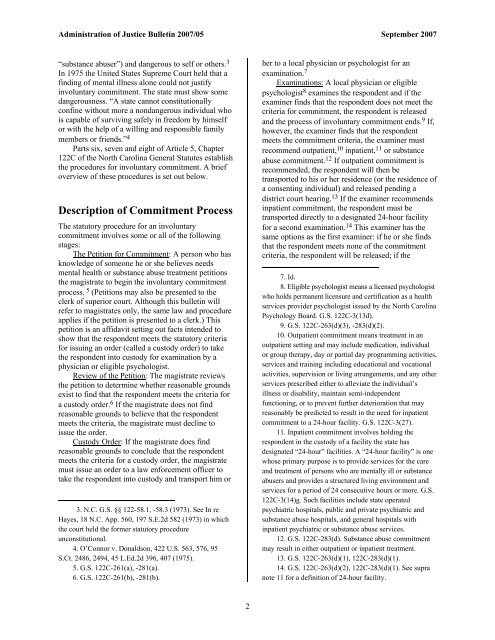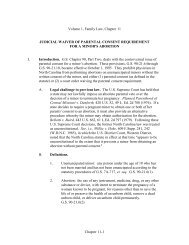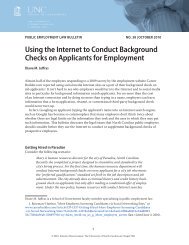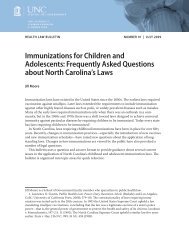administration of justice bulletin - School of Government Bookstore ...
administration of justice bulletin - School of Government Bookstore ...
administration of justice bulletin - School of Government Bookstore ...
Create successful ePaper yourself
Turn your PDF publications into a flip-book with our unique Google optimized e-Paper software.
Administration <strong>of</strong> Justice Bulletin 2007/05 September 2007<br />
“substance abuser”) and dangerous to self or others. 3<br />
In 1975 the United States Supreme Court held that a<br />
finding <strong>of</strong> mental illness alone could not justify<br />
involuntary commitment. The state must show some<br />
dangerousness. “A state cannot constitutionally<br />
confine without more a nondangerous individual who<br />
is capable <strong>of</strong> surviving safely in freedom by himself<br />
or with the help <strong>of</strong> a willing and responsible family<br />
members or friends.” 4<br />
Parts six, seven and eight <strong>of</strong> Article 5, Chapter<br />
122C <strong>of</strong> the North Carolina General Statutes establish<br />
the procedures for involuntary commitment. A brief<br />
overview <strong>of</strong> these procedures is set out below.<br />
Description <strong>of</strong> Commitment Process<br />
The statutory procedure for an involuntary<br />
commitment involves some or all <strong>of</strong> the following<br />
stages:<br />
The Petition for Commitment: A person who has<br />
knowledge <strong>of</strong> someone he or she believes needs<br />
mental health or substance abuse treatment petitions<br />
the magistrate to begin the involuntary commitment<br />
process. 5 (Petitions may also be presented to the<br />
clerk <strong>of</strong> superior court. Although this <strong>bulletin</strong> will<br />
refer to magistrates only, the same law and procedure<br />
applies if the petition is presented to a clerk.) This<br />
petition is an affidavit setting out facts intended to<br />
show that the respondent meets the statutory criteria<br />
for issuing an order (called a custody order) to take<br />
the respondent into custody for examination by a<br />
physician or eligible psychologist.<br />
Review <strong>of</strong> the Petition: The magistrate reviews<br />
the petition to determine whether reasonable grounds<br />
exist to find that the respondent meets the criteria for<br />
a custody order. 6 If the magistrate does not find<br />
reasonable grounds to believe that the respondent<br />
meets the criteria, the magistrate must decline to<br />
issue the order.<br />
Custody Order: If the magistrate does find<br />
reasonable grounds to conclude that the respondent<br />
meets the criteria for a custody order, the magistrate<br />
must issue an order to a law enforcement <strong>of</strong>ficer to<br />
take the respondent into custody and transport him or<br />
3. N.C. G.S. §§ 122-58.1, -58.3 (1973). See In re<br />
Hayes, 18 N.C. App. 560, 197 S.E.2d 582 (1973) in which<br />
the court held the former statutory procedure<br />
unconstitutional.<br />
4. O’Connor v. Donaldson, 422 U.S. 563, 576, 95<br />
S.Ct. 2486, 2494, 45 L.Ed.2d 396, 407 (1975).<br />
5. G.S. 122C-261(a), -281(a).<br />
6. G.S. 122C-261(b), -281(b).<br />
her to a local physician or psychologist for an<br />
examination. 7<br />
Examinations: A local physician or eligible<br />
psychologist 8 examines the respondent and if the<br />
examiner finds that the respondent does not meet the<br />
criteria for commitment, the respondent is released<br />
and the process <strong>of</strong> involuntary commitment ends. 9 If,<br />
however, the examiner finds that the respondent<br />
meets the commitment criteria, the examiner must<br />
recommend outpatient, 10 inpatient, 11 or substance<br />
abuse commitment. 12 If outpatient commitment is<br />
recommended, the respondent will then be<br />
transported to his or her residence (or the residence <strong>of</strong><br />
a consenting individual) and released pending a<br />
district court hearing. 13 If the examiner recommends<br />
inpatient commitment, the respondent must be<br />
transported directly to a designated 24-hour facility<br />
for a second examination. 14 This examiner has the<br />
same options as the first examiner: if he or she finds<br />
that the respondent meets none <strong>of</strong> the commitment<br />
criteria, the respondent will be released; if the<br />
7. Id.<br />
8. Eligible psychologist means a licensed psychologist<br />
who holds permanent licensure and certification as a health<br />
services provider psychologist issued by the North Carolina<br />
Psychology Board. G.S. 122C-3(13d).<br />
9. G.S. 122C-263(d)(3), -283(d)(2).<br />
10. Outpatient commitment means treatment in an<br />
outpatient setting and may include medication, individual<br />
or group therapy, day or partial day programming activities,<br />
services and training including educational and vocational<br />
activities, supervision or living arrangements, and any other<br />
services prescribed either to alleviate the individual’s<br />
illness or disability, maintain semi-independent<br />
functioning, or to prevent further deterioration that may<br />
reasonably be predicted to result in the need for inpatient<br />
commitment to a 24-hour facility. G.S. 122C-3(27).<br />
11. Inpatient commitment involves holding the<br />
respondent in the custody <strong>of</strong> a facility the state has<br />
designated “24-hour” facilities. A “24-hour facility” is one<br />
whose primary purpose is to provide services for the care<br />
and treatment <strong>of</strong> persons who are mentally ill or substance<br />
abusers and provides a structured living environment and<br />
services for a period <strong>of</strong> 24 consecutive hours or more. G.S.<br />
122C-3(14)g. Such facilities include state operated<br />
psychiatric hospitals, public and private psychiatric and<br />
substance abuse hospitals, and general hospitals with<br />
inpatient psychiatric or substance abuse services.<br />
12. G.S. 122C-283(d). Substance abuse commitment<br />
may result in either outpatient or inpatient treatment.<br />
13. G.S. 122C-263(d)(1), 122C-283(d)(1).<br />
14. G.S. 122C-263(d)(2), 122C-283(d)(1). See supra<br />
note 11 for a definition <strong>of</strong> 24-hour facility.<br />
2













